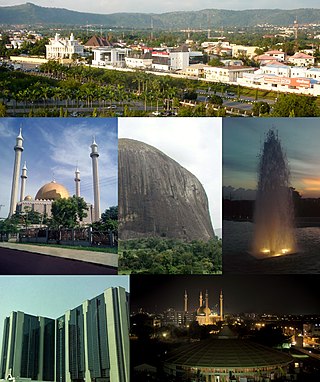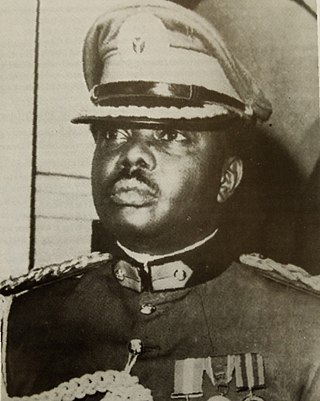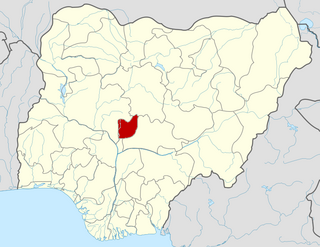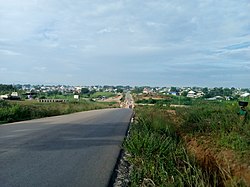
Abuja is the capital and eighth most populous city of Nigeria. Situated at the centre of the country within the Federal Capital Territory (FCT), it is a planned city built mainly in the 1980s based on a master plan by International Planning Associates (IPA), a consortium of three American planning and architecture firms made up of Wallace, Roberts, McHarg & Todd as the lead, Archi systems International, and Planning Research Corporation. The Central Business District of Abuja was designed by Japanese architect Kenzo Tange. It replaced Lagos, the country's most populous city, as the capital on 12 December 1991.

Murtala Ramat Muhammed was a Nigerian general who led the 1966 Nigerian counter-coup in overthrowing the Johnson Aguiyi-Ironsi military regime and featured prominently during the Nigerian Civil War and thereafter ruled over Nigeria from 29 July 1975 until his assassination on 13 February 1976. This period in Nigerian history, from the Northern counter-coup victory to Murtala's death, is commonly associated with the institutionalization of the military in politics.

The president of the Federal Republic of Nigeria is the head of state and head of government of the Federal Republic of Nigeria. The president directs the executive branch of the federal government and is the commander-in-chief of the Nigerian Armed Forces.

Shehu Usman Aliyu Shagari was a Nigerian politician who was the first democratically elected president of Nigeria, after the transfer of power by military head of state General Olusegun Obasanjo in 1979 giving rise to the Second Nigerian Republic.

The Federal Capital Territory (FCT) is a federal territory in central Nigeria. Abuja, the capital city of Nigeria, is located in this territory. The FCT was formed in 1976 from parts of the states of old Kaduna, Kwara, Niger, and Plateau states, with the bulk of land mass carved out of Niger state. The Federal Capital Territory is within the North Central region of the country. Unlike other states of Nigeria, which are headed by elected Governors, it is administered by the Federal Capital Territory Administration, headed by a minister, who is appointed by the president.
The National Security Organization (NSO) of Nigeria, or Nigerian Security Organization, was created under Decree number 27 of 1976 by the military regime of Gen. Olusegun Obasanjo, after the failed Dimka coup which claimed the life of former Head of State Gen. Murtala Mohammed. The NSO was given a mandate of co-ordinating Internal Security, Foreign Intelligence and counterintelligence activities. It was charged with the detection and prevention of any crime against the security of the state, with the protection of classified materials, and with carrying out any other security missions assigned by the president.

The Second Nigerian Republic was a brief formation of the Nigerian state which succeeded the military governments formed after the overthrow of the first republic.
Gwandara is a West Chadic language, and the closest relative of Hausa. Its several dialects are spoken in northern Nigeria, predominantly in the north central region of Nigeria by the Gwandara people and some settlers who are about 30,000 people. They are found in large numbers in Abuja, Niger, Kaduna, Kogi and a resettlement town of New Karshi, Karu LGA, Nasarawa State. New Karshi has a Gwandara first class emir Muhammadu Bako III (PhD).
Jonathan Tunde OgbehaListen is a Nigerian politician and retired brigadier general who served as the administrator of Akwa Ibom State and then of Bendel State during the military rule of General Ibrahim Babangida (1985–1993). After the return to democracy in 1999, he was elected senator for the Kogi West constituency of Kogi State from May 1999 to May 2007. A biography on Ogbeha titled "Jonathan Tunde Ogbeha: A Noble Path" was written by Innocent Nzeke Waniko, a journalist, and presented publicly on 1 September 2017. The book chronicles the early life and comprehensively captures the life and career of Ogbeha.

Mohammed Bello Kaliel was a Nigerian Army Colonel and the first Governor of Bauchi State, Nigeria after it was created on 3 February 1976 when North-Eastern State was divided into Bauchi, Borno, and Gongola states, during the military regime of General Olusegun Obasanjo. He held office until July 1978.

Chief (Dr.) Solomon Daushep Lar was a Nigerian politician who has held various offices at the National level for over 50 years. He was a member of the first national parliament when Nigeria gained independence in 1960. He was elected governor of Plateau State on the Nigerian People's Party (NPP) platform during the Nigerian Second Republic, holding office from October 1979 until the Military coup of 31 December 1983 that brought General Muhammadu Buhari to power. Later, he was founding chairman of the People's Democratic Party (PDP).
The Karu Urban Area is an urban area in central Nigeria. The urban area is majorly located in the Nigerian state of Nasarawa, but with some parts stretching into the boundaries of the Federal Capital Territory (FCT). It has an area of 40,000 hectares (400 km2) and a population of some 2 million.
Zaynab Alkalipronunciation was born into the Tura-Mazila family of Borno and Adamawa States. For secondary education, she attended Queen Elizabeth Secondary School, Ilorin. Zaynab Alkali went on to obtain both her first and second degrees from Ahmadu Bello University (ABU)/BUK, Zaria. At Bayero University Kano (BUK), she studied English to a doctorate level.

The Nigerian military coup of 1983 took place on 31 December that year. It was coordinated by key officers of the Nigerian military and led to the ousting of the democratically elected government of President Shehu Shagari and the installation of Major General Muhammadu Buhari as head of state.
Karshi is located in the Federal Capital Territory, a satellite town situated in Abuja Municipal Area Council in Nigeria. Its geographical coordinates are 8° 49' 40" North, 7° 33' 0" East and its original name is Karshi. Karshi is about 38 km to Federal capital city of Abuja and 41 km from Karshi to Apo.
Mohammed Abubakar Adamu is a Nigerian retired police officer who is formerly the 20th Nigerian inspector-general of police. He was appointed by President Muhammadu Buhari on 15 January 2019 replacing Ibrahim Kpotun Idris (rtd) of Niger State. Mohammed Adamu hails from Lafia, in Nasarawa State. He was replaced on 6 April 2021 with Usman Alkali Baba.

Ibrahim Usman Jibril CON is a Nigerian traditional ruler and administrator. He is the 12th Emir of Nasarawa Emirate and He was the Minister of State for Environment between 2015 and 2018 in the President Muhammadu Buhari led administration.
Ramatu Tijani Aliyu is a Nigerian politician from Kogi State, Nigeria. She served as the Minister of State for Federal Capital Territory (FCT) appointed by president Muhammadu Buhari on August 21, 2019. Ramatu was previously the National Woman Leader of the All Nigeria Peoples Party (ANPP) later All Progressive Congress (APC) after the party and other political parties merged.
Muhammadu Sani Bako IIIpronunciation is a prominent member of Gwandara people and a first-class Emir of New Karshi in Nasarawa. He was a career federal civil servant. He is a senior member of Nasarawa State Council of Traditional Rulers, and chairs the Governing Council of Nasarawa State Polytechnic, Lafia. He holds a Doctor of Philosophy, PhD in Political Economy and Development Studies from the University of Abuja. He was the Magajin Garin Karshi.














